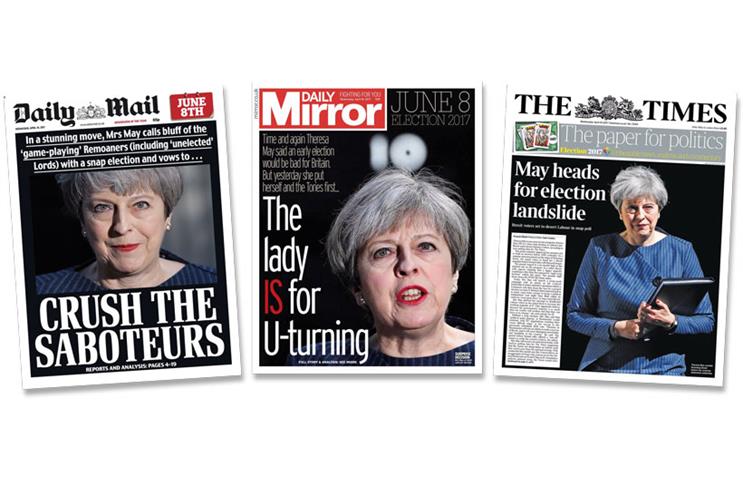
Since Theresa May called a snap election, two stories have dominated discussion about the role of the media.
There has been the "will she/won’t she" TV debate saga and speculation about how badly behaved newspapers could be over the course of the campaign.
It is ironic that there should be so much debate about political bias in newspapers, even as doubters question the influence of the press.
18- to 24-year-olds are more likely to cite newspapers (43%) than social media (41%) as a place where they find out about politics
If news brands are irrelevant to readers, why do they still occupy so much airtime? Why bother taking them to task over their self- declared biases if they hold no weight anyway?
The fact is that newspapers come into their own at times like this.
In this country, we’re lucky enough to have more than 20 national titles, reaching 47 million people with a spread of political views and voices. It’s this unbridled range of opinions that defines news brands and sets them apart from broadcasters such as the BBC.
Democracy means having an outspoken, challenging and uncensored press that holds politicians to account. You’re never going to agree with everything that is written, but that’s the point. Whether you’re a paid-up Guardian member or a Mail devotee, there should be one thing you can agree on (several actually, but more on that later) – newspapers are indispensable at election time.
Why? Precisely because they are not balanced or bland on the one hand, or downright cynical or mischievous on the other, as tends to be the case where the more exotic, fake-news-infested reaches of the internet are concerned.
The figures back up this role. Newsworks research, conducted in conjunction with Tapestry and focused on 1,000 adults, found that 55% of people learn about politics from newspapers (19% cited social media). Even 18- to 24-year-olds are more likely to cite newspapers (43%) than social media (41%) as a place where they find out about politics.
Newspapers emerged as the strongest indicator of how people defined themselves, over age and social class
I put this down to the fact that our national press are committed to lively, intense and engaged political debate. What’s more, readers understand and value this purpose.
When it comes to election campaigns, we often get caught up in quantifying news- papers’ influence on the electorate. Think "It’s The Sun wot won it" in 1992. This mindset presumes an old-fashioned, one-sided dichotomy where the press is dictating to the masses. As ever, things just aren’t as linear as that.
Our research shows that people gravitate towards titles that hold similar values to them and rely on them to help navigate a wide range of topics. In fact, newspapers emerged as the strongest indicator of how people defined themselves, over age and social class.
Yet there is a difference between drawing on newspapers to help build an understanding of an issue and unquestioningly accepting everything that is written. Reading the opinions of others helps galvanise what we do and don’t agree with. It’s a relationship built on discourse rather than dictation.
On a broader level (here comes the "later"), just as the relationships between newspapers and readers are more complex than often presumed, so are the readers themselves. While it’s easy and sometimes necessary to lump people together into clearly defined groups, it can blind us to crossovers and correlations. By examining what divides and what unites people, shared beliefs and values can emerge.
In these politically charged times, it can be tempting to take a linear view both of people and the press – in vs out, left vs right, right vs wrong – but this negates the complexities and contradictions that come with democracy.
This is what our press embodies. Without it, we lose the texture and authenticity of politics.
So, here we go again? Absolutely.
Vanessa Clifford is the chief executive of Newsworks

